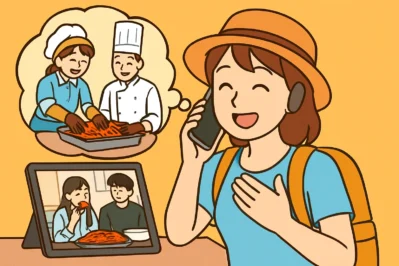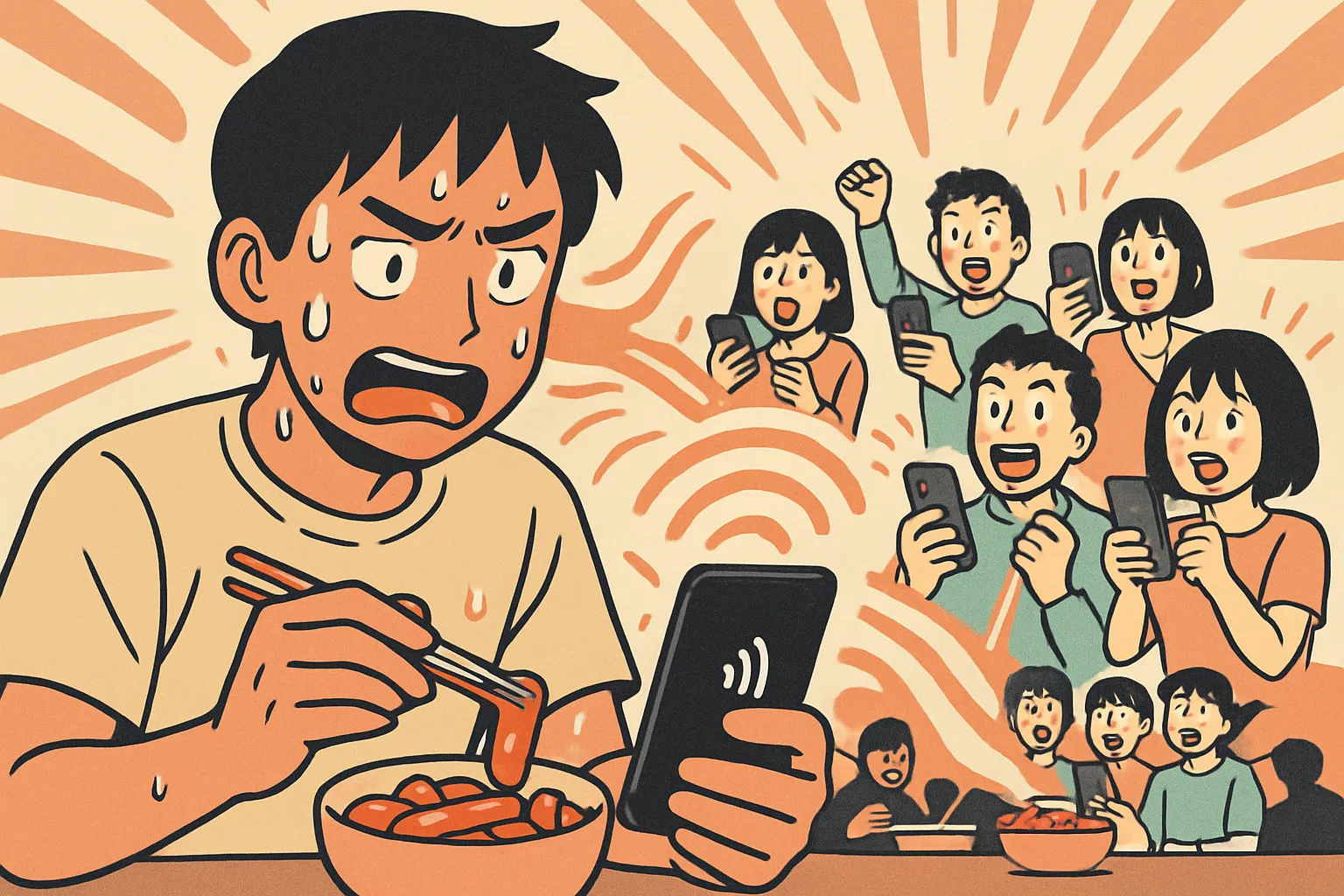Cook Like a K-Drama Star: Master Korean Cooking Class Reservations!
Hello! This is [Daily Hangul], here to upgrade your Korean skills!
Have you ever watched a K-drama and found yourself drooling over the characters’ meals? From the sizzling samgyeopsal (pork belly) to a comforting bowl of kimchi-jjigae (kimchi stew), Korean food is a star in its own right. Well, what if you could learn to make those dishes yourself during your next trip to Korea?
Lately in Korea, “one-day cooking classes” (원데이 클래스) are a huge trend, especially those that teach you how to cook food featured in popular dramas and movies! Today, we’ll learn the essential Korean phrases to book one of these amazing classes smoothly and politely. Let’s get cooking!
Core Expressions for Your Culinary Adventure
Here are the key phrases you need to sound like a confident, polite Korean speaker when making a reservation.
1. ~ㄹ/을 수 있을까요? (reul/eul su isseulkkayo?)
- Meaning: Could I possibly…? / Would it be possible to…?
- Detailed Explanation: This is a step up from the basic
~ㄹ/을 수 있어요?. Using~까요?at the end makes your question softer, more indirect, and much more polite. It’s perfect for making requests over the phone or via email, as it shows consideration for the other person’s time and situation.- Example: 요리 수업을 예약할 수 있을까요? (Yori sueobeul yeyakhal su isseulkkayo?) – Could I possibly book a cooking class?
2. 혹시 (hoksi)
- Meaning: By any chance / Perhaps
- Detailed Explanation:
혹시is a magic word in Korean! Placing it at the beginning of a question instantly softens the tone. It signals that you’re aware your request might not be possible, which is a very polite way to ask for something. It pairs perfectly with~ㄹ/을 수 있을까요?.- Example: 혹시 이번 주 토요일에 자리가 있나요? (Hoksi ibeon ju toyoire jariga innayo?) – By any chance, are there any spots available this Saturday?
3. ~에 관심이 많다 (e gwansimi manta)
- Meaning: To be very interested in ~
- Detailed Explanation: When you’re booking a class, you’re not just a customer; you’re an enthusiastic student! Use this phrase to express your passion. It helps build a friendly connection with the staff or instructor and shows your genuine interest in Korean culture.
- Example: 최근에 종영한 드라마에 나온 궁중 요리에 관심이 많아요. (Choegeune jongyeonghan deuramae naon gungjung yorie gwansimi manayo.) – I’m very interested in the royal court cuisine that was in the recently finished drama.
4. ~으로 부탁드립니다 (euro butakdeurimnida)
- Meaning: I’d like it as ~, please. / For ~, please.
- Detailed Explanation: This is the ultimate polite phrase for making specific requests in service situations. While
~주세요is correct,~으로 부탁드립니다is more formal and respectful. Use it when specifying the number of people, a specific date, or a course.- Example: 성인 2명으로 부탁드립니다. (Seongin du myeongeuro butakdeurimnida.) – For two adults, please.
Example Dialogue: Booking a Class
Let’s see how these expressions work in a real conversation between a learner (A) and a cooking class staff member (B).
A: 여보세요. 혹시 요리 수업을 예약할 수 있을까요?
(Yeoboseyo. Hoksi yori sueobeul yeyakhal su isseulkkayo?)
Hello. By any chance, would it be possible to book a cooking class?
B: 네, 안녕하세요! 물론입니다. 어떤 수업을 원하세요?
(Ne, annyeonghaseyo! Mullonimnida. Eotteon sueobeul wonhaseyo?)
Yes, hello! Of course. What kind of class are you interested in?
A: 요즘 유행하는 ‘K-드라마 한식’ 수업에 관심이 많아요.
(Yojeum yuhaenghaneun ‘K-deurama hansik’ sueobe gwansimi manayo.)
I’m very interested in the trendy ‘K-Drama Korean Food’ class.
B: 아, 네! 인기가 아주 많은 수업이죠. 몇 분 예약 도와드릴까요?
(A, ne! Ingiga aju maneun sueobijyo. Myeot bun yeyak dowadeurilkkayo?)
Ah, yes! That’s a very popular class. For how many people can I help you with a reservation?
A: 2명으로 부탁드립니다.
(Du myeongeuro butakdeurimnida.)
For two people, please.
B: 알겠습니다. 성함과 연락처 알려주시겠어요?
(Algesseumnida. Seonghamgwa yeollakcheo allyeojusigesseoyo?)
Understood. Could you please give me your name and contact number?
Culture Tip & Trend Deep Dive
The “One-Day Class” (원데이 클래스) Culture!
In Korea, especially among the Z generation, spending a day learning a new skill is a very popular way to have fun. These are called “One-Day Classes” (원데이 클래스). You can find them for everything from baking and coffee brewing to pottery and, of course, cooking!
Pro Tip: When you call to book, try mentioning a specific drama! For example, “I saw the Japchae in the drama ‘King the Land’ and I’d love to learn how to make it!” ('킹더랜드'라는 드라마에서 잡채를 봤는데, 꼭 배워보고 싶어요!). This shows you’re a true K-culture fan and can be a fantastic conversation starter with your teacher!
Wrap-up & Practice Time!
Great job today! You’ve learned four key expressions to politely and confidently book a cooking class in Korean. You now know how to ask politely (~ㄹ/을 수 있을까요?), soften your question (혹시), express your interest (~에 관심이 많아요), and make a specific request (~으로 부탁드립니다).
Now, let’s test your skills!
- Fill in the blank: You want to ask if there’s a class for beginners.
초보자를 위한 수업도 ___________? (Chobojareul wihan sueopdo ___________?)
(Answer: 있을까요?)
-
Make a sentence: You want to book a class for one person politely using an expression we learned today. How would you say it?
(Answer: 1명으로 부탁드립니다.)
You’re all set for your Korean culinary journey! Now it’s your turn. Leave a comment below telling us what Korean dish you’re most interested in learning, using the phrase ~에 관심이 많아요!






